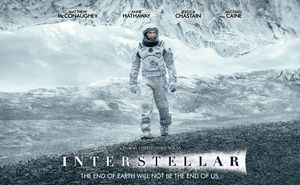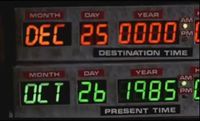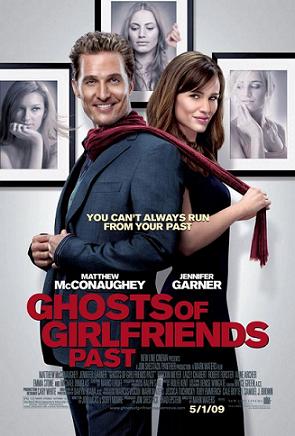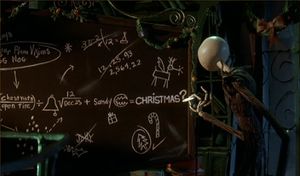Why?:Interstellar is a Christmas movie
We all have a favorite Christmas movie. One of those timeless pieces of nostalgia that we watch year after year with a cup of cocoa and the family gathered around the screen. Many people select their favorite holiday film from the standard Christmas canon: Die Hard, Gremlins, Lethal Weapon, Batman Returns, Eyes Wide Shut and Iron Man 3. You know, the classics. I myself like to think outside the box - or the tesseract, if you will. I'm going to pull a wild card and state that my favorite Christmas movie is Christopher Nolan's Interstellar.
"You dingbat!" you throw an insult at me and hurt my feelings. "Interstellar isn't a Christmas movie. It's about dust and space and black holes and time travel and confusing sciencey stuff. It couldn't have less to do with Christmas." Ah, but that's where you're mistaken, my hurtful, mean friend! Not only is it a Christmas movie, but it's arguably the greatest and most Christmasy Christmas movie ever made.
I can see from the look on your face that you don't believe me. That's a shame. Belief is what matters most in a world torn apart by sadness and cynicism. Of course, I'm also aware that our world is governed by science, reason and logic. Thus, I will make my case and soon you too will see the magic of Christmas on full display in Interstellar.
It takes place on Christmas[edit | edit source]
It's axiomatic that a movie qualifies as a Christmas movie if it takes place on Christmas Eve or Christmas Day. You would assume Interstellar doesn't, but that's because you're not thinking fourth-dimensionally, Marty.
Take the scene in where McConaughey descends into the black hole and is taken to a spacetime tesseract realm where he's given the ability to see before his eyes various days in his and his daughter's life all at once. He is, in effect, not only viewing all of time, but floating through all of time. All of time. That includes Christmas Day.
Not just Christmas Day, but every Christmas Day. In fact, the tesseract encompasses every possible sequence of time in the history of the universe that can be considered "Christmas". Every Christmas Eve and every Christmas season. Every Black Friday, Cyber Monday and Christmas in July sale. Every Boxing Day, Epiphany and the Eastern Orthodox Church's sorry-ass January version of Christmas. Even the exact day on which Jesus Christ was born was a part of McConaughey's tesseract playpin.
What further argument do you need? Any movie can take place during Christmas, but only Interstellar manages to take place during the totality of Yuletide existence. Not a Christmas movie? Fuck you. It's the omni-Christmas movie.
Time travel is a staple of Christmas stories[edit | edit source]
Time travel is not only a major element of this movie, but is also a reccuring theme in many Christmas stories you've read once in your high school English class and seen ripped off by every sitcom and hacktacular holiday special.
For example, Charles Dickens' A Christmas Carol is a Victorian time travel story with socialist ghosts. It's A Wonderful Life has an angel show a suicidal loser an alternate timeline in which his father pulled out soon enough. Groundhog Day[1] throws our favorite Ebenezer Scrooge Bill Murray into a time loop so he can stalk his co-worker.
These are all technically time travel and parallel universe stories, and they all involve some lost man placed on the right path by people in high places. Interstellar is just a rehash of that story in a 21st century sci-fi package. Everyone's least favorite Scrooge Matthew McConaughey has invisible higher-dimensional beings from the distant future show him visions of his life so that he may come to realize how much of a neglectful turd he is to his daugther. If it wasn't painfully obvious that this was just A Christmas Carol in space, there's even a flippin' ghost from the future involved. And what a twist that was.[2]
Love and Family[edit | edit source]
It wouldn't be a true Christmas movie if it didn't have a shameless sentimental message involving love and family. Die Hard didn't earn its own title as "the greatest Christmas movie" because it has two or three references to Christmas and a bunch of people decided to call it a Christmas movie to be ironic and edgy. It's because it has such a touching story of one man's triumph over evil in order to reunite with his wife. Similarly, Interstellar is about a man desperately trying to get back to his daughter after he basically abandoned her. This could easily be a Lifetime movie, except it doesn't blow chunks.
Okay, so it has a sweet story about a father and daughter. Does that necessarily make it a Christmas movie? No, what brings it over that threshold is its emphasis on...
| THE POWER OF LOVE! |
This is displayed most bare nakedly in the scene where the crew of the Endurance has to choose a planet on which to land. Dr. Amelia Brand insists they land on the Edmunds desert planet, named after astronaut Dr. Wolf Edmunds who traveled there years before and presumably died. Though she makes a case based on reasoned arguments involving its distance from the black hole and its potential sustainability for human life, she really wanted to land there because she's always been in love with Dr. Edmunds.
| “ |
Cooper: You're a scientist, Brand. Brand: So listen to me when I say that love isn't something that we invented. It's... observable, powerful. It has to mean something. Cooper: Love has meaning, yes. Social utility, social bonding, child rearing... Brand: We love people who have died. Where's the social utility in that? Cooper: None. Brand: Maybe it means something more - something we can't yet understand. Maybe it's some evidence, some artifact of a higher dimension that we can't consciously perceive. I'm drawn across the universe to someone I haven't seen in a decade, who I know is probably dead. Love is the one thing we're capable of perceiving that transcends dimensions of time and space. Maybe we should trust that, even if we can't yet understand it. |
” |
In other words, she's not describing the power of love as something poetic, but as an actual propulsive force from a higher dimension, whose strength reaches beyond even the mortal confines of death. She's proven right when Cooper descends into a freaking black hole, survives, and is eventually reunited with his daughter thanks presumably to the all-powerful Higher-Dimensional Love.
Doesn't this seem a little...really fucking stupid? At the very least out of place for what is supposed to be a science fiction film. Not just science fiction, but hard science fiction. One that actually brags about how it had a well-known physicist on staff to make sure the science featured in it was accurate. Why is an alledged hard science fiction film pandering to something so hippy and lame?
That's because it's not merely a sci-fi film, hard or otherwise. It's a Christmas movie! What movie but a Christmas movie would be sugary and cheesy[3] enough to not only use the magical "power of love" as a central theme, but exalt it to literally transcend the known laws of science? That's right. Matthew McConaghey traveling into a black hole and surviving wasn't some really out-there speculative sci-fi. It was a miracle! *wipes tear from eye*
Christmas symbolism[edit | edit source]
Let's get to the meat of the movie. McConaghey plays former engineer Joseph Cooper turned farmer in the middle of a global Dust Bowl. He's mourning the state of the world and the death of the pioneer spirit, until everyone's second-favorite Scrooge Michael Caine sends him and a crew of astronauts into a wormhole to seek a habitable world in a distant galaxy. We find out the planets suitable for human life orbit a black hole.
In other words, Cooper is a wise man following a star.
Do you need to be hit over the head?! Could it be more obvious?! This is blatant Christian symbolism! This movie is referencing the damn Nativity! I could drop the mic now, but I think I'll continue just to rub it in.
Interstellar goes deeper than the Christianity of Christmas by appealing to the pagan roots of the holiday as well. Before the time of Christ, December was marked with winter solstice festivals. This was when the harvest was gathered and societies would throw one last bash before winter, which to ancient people was a little taste of the apocalypse. In this movie, mankind is facing an actual apocalypse, only to be saved after the wise man follows a star. Here the movie brilliantly fuses the holiday's pagan and Christian roots with one transitioning into the other.[4] By the third act, we learn that mankind ultimately saves itself rather than relying on some vague beings from a higher reality. We are our own God. This could be a foreshadow into the future of Christmas, when the decline of Christianity forces Christmas to be reconstructed back purely into a midwinter holiday. A secular one that emphasizes humanity's ability to persevere through the worst of nature's cruelities. Interstellar essentially features "the Ghosts of Christmas Past, Present and Yet-to-Come" on a more meta level by portraying the evolution of Christmas itself.
So the question beckons: Why is it an apocalypse of dust rather than snow? Why couldn't the movie be about a new ice age? Because Jesus Christ never saw snow in his life. He lived in the dusty sand barren armpit of the world. Crucifixion is one thing, but 30 years of sand in your asscrack is no picnic either. In Interstellar, humanity suffers like Jesus suffered. Whether the writers intended to or not, they gave the edge to Christianity. Idiots. Jesus: 1, Secular Humanism: 0.
Up on the housetop[edit | edit source]
Another allusion to Christmas comes again from the key scene where he descends into the tesseract realm. This is a painfully obvious, direct reference to Santa Claus coming down the chimney, just as John McClane crawling through the vents in Die Hard was a reference to Santa and chimneys. I mean, Interstellar is not only alluding to Christmas folklore, but it's referencing another Christmas movie. That's proof enough that it itself is a Christmas movie, and that I'm not just grabbing at straws and pulling stuff out of my ass.
But..if by slim chance your hard head is still not convinced, I have one more card up my sleeve...
Interstellar was written by an elf![edit | edit source]
As mentioned before, Interstellar had a scientific consultant to help write it, that being CalTech theoretical physicist Kip Thorne. What does this have to do with Christmas? Well just as Interstellar masks itself as a product of hard science to hide the holiday magic, I personally believe Kip Thorne is secretly more than a brilliant physicist - he's an elf! Yes, an elf! I mean, just just look at him:
Does he not look like an elf? The ears. The face. My God, the teeth.
No, wait...a gnome. That's the mythical creature I'm thinking of. He's a gnome. A pedophilic gnome. Okay, listen, if you never heard of Santa Claus before and I described him to you, wouldn't "pedophilic gnome" be an apt description? Yeah, that's what Kip Thorne is. Probably. Close enough.
Conclusion[edit | edit source]
It's a well-known fact that Christopher Nolan is red-green colour blind, and this influences the tone and color palette of his movies. However, it also means that he's tragically spent his entire life robbed of the beautify of these particular colors, and by extent the full joy of Christmas itself. Like Jack Skellington before him, Nolan clearly created Interstellar to explore, on a rigorously minute level, the wonder and magic of Christmas for himself, and then present his own unique vision to the world.
As far of his own filmography goes, Nolan has topped himself again with this new holiday classic. It's only a matter of time before TBS plays 24 hour marathons of Interstellar. It has exactly everything you could ask in a Christmas movie and more. It is as much a Christmas movie as Father Christmas himself exists, as much as bootstrap paradoxes make logical sense, and as much a love is the fifth fundamental force of physics.
Footnotes[edit | edit source]
|








